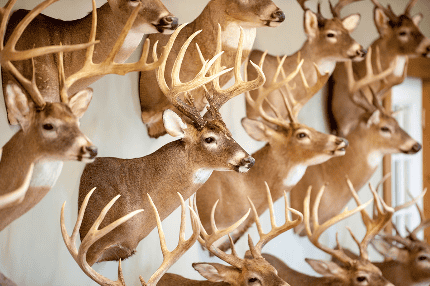Hunting trophies are not just physical representations of a successful hunt; they also hold sentimental value and memories of the adventure, and challenges faced in the great outdoors. However, beyond their aesthetic appeal, hunting trophies also come with a set of responsibilities that hunters should be aware of.
One crucial aspect of owning hunting trophies is keeping detailed records of each trophy. This includes paperwork such as the US Fish and Wildlife Service Law Enforcement Form 3177 and CITES (Convention on International Trade in Endangered Species) permits, if applicable. These documents are essential for legal compliance and demonstrate that the hunt was conducted ethically and in accordance with regulations.
In addition to the necessary paperwork, it is important to keep records of hunting permits, dates, times, and locations of each hunt. This information not only helps hunters track their achievements but also serves as crucial evidence in case of any legal issues or investigations by law enforcement agencies.
Furthermore, keeping detailed records of hunting trophies can also be beneficial for potential future donations to a 501(c)(3) organization for tax purposes. The IRS requires documentation of the value of donated items, including hunting trophies, so having thorough records can support your donation claim and ensure compliance with tax regulations.
Moreover, for hunters interested in the competitive aspect of hunting, maintaining records related to trophy record book rankings in prestigious organizations such as Safari Club International, The Boone and Crockett Club, Roland Ward, or other respected entities in the hunting industry is essential. These organizations recognize exceptional hunting achievements and maintain records of trophy sizes, scores, and other relevant data.
Keeping meticulous records of hunting trophies is not only a legal requirement but also a way to honor the animals harvested and the conservation efforts that go hand in hand with hunting. By documenting paperwork, permits, hunt details, and trophy rankings, hunters can ensure they are upholding ethical standards, complying with regulations, and preserving their hunting legacy for years to come.
Finally, a well-documented taxidermy collection increases in value with the more detailed records kept by the hunter. Each successful hunt should be documented maintaining the smallest of monetary expenses and information regarding the animal hunted starting with the Common and Scientific Name including the subspecies, if any.
We recently appraised an older collection which was well documented. In the paperwork we found Fish and Wildlife Clearance Paperwork for entry of the collection into the United States from the 1950s. This evidence literally increased the value of the taxidermy we were appraising.
People hunt and collect for many reasons and paperwork regarding the hunt or acquisition has never been more important than today in our changing world. A perfect paper trail assist us and our family to deal with issues relating to chain of title, important dates and more. We cannot rely on our memories or the memories of our family and friends to detail our hunting expeditions.
Unfortunately, we have delt with many excellent collections that have diminished in value because of poor record keeping. Keeping a simple box or file of each hunt documenting hunt cost, taxidermy cost, etc., to ensure maintaining the best outcome when it comes time to deal with the disposition of your prized hunting trophies.
